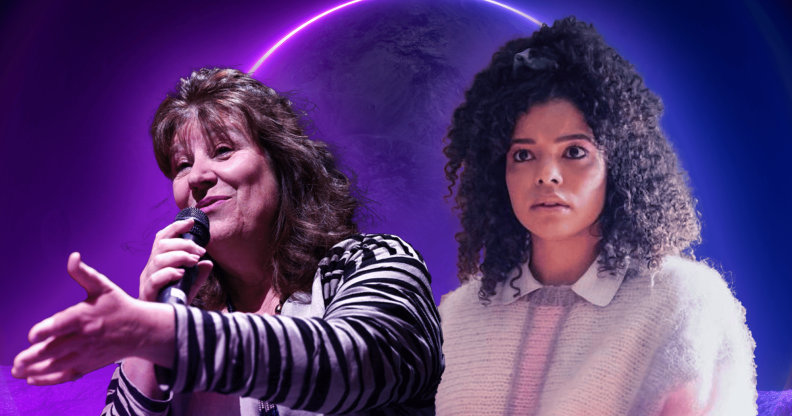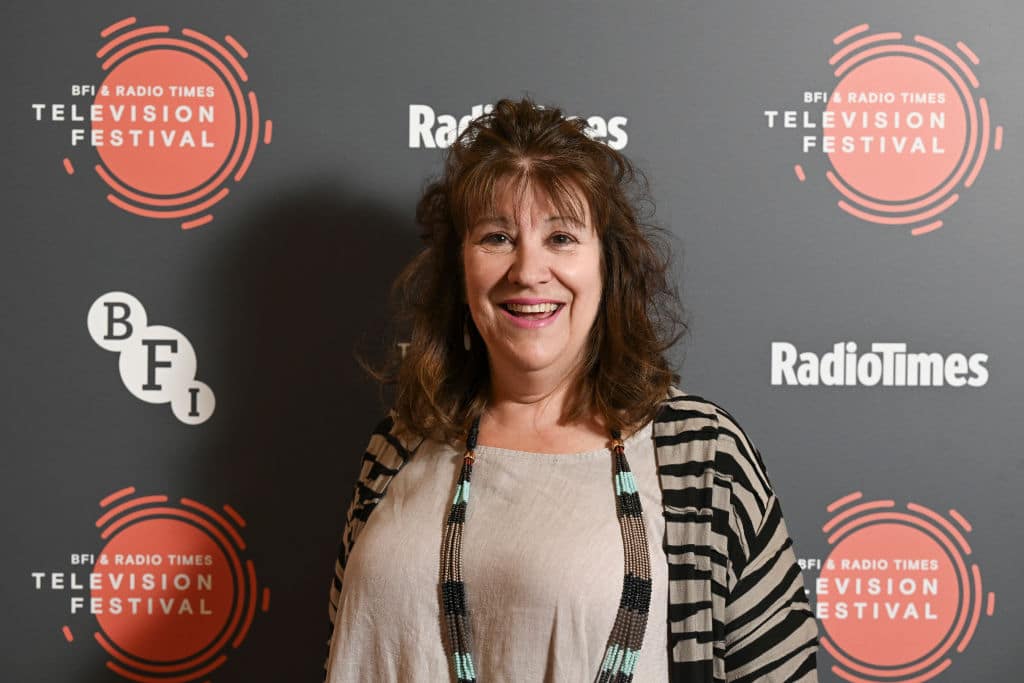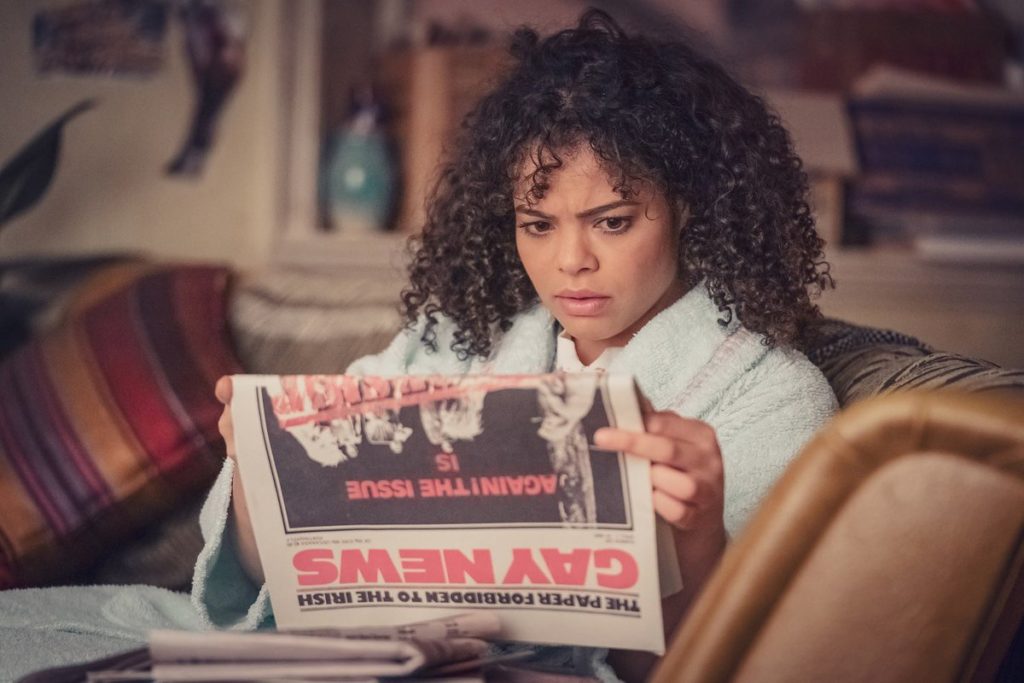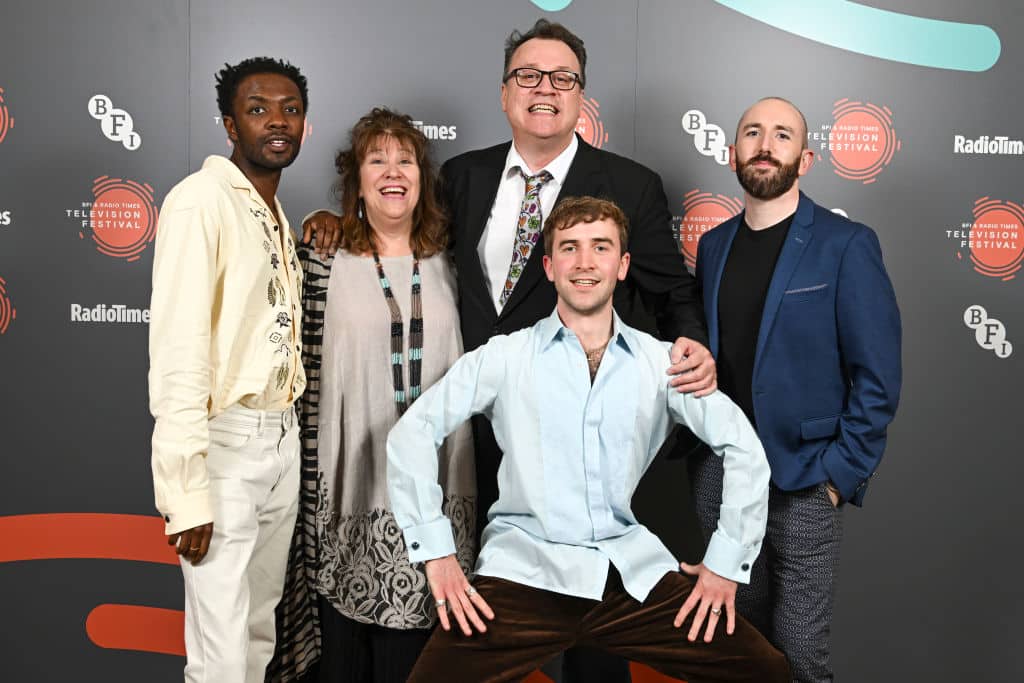Real-life inspiration behind It’s a Sin’s Jill says monkeypox moral panic feels crushingly familiar

Jill Nalder (L) was the inspiration for Lydia West’s character (R) in It’s a Sin. (Getty/Channel 4/PinkNews)
When It’s a Sin hit TV screens in 2021, it was clear that the world was witnessing something special.
The Russell T Davies show, which explored the journey of a fictional friendship group of mostly queer men in 1980s London, re-ignited conversations about the experience of living through the AIDS crisis and educated younger generations about one of the darkest moments in queer history.
One character who struck a particular chord with viewers was Jill, portrayed by actor Lydia West. Jill guided her gay friends through the crisis, holding their hands in the most difficult of days. The hashtag #BeMoreJill went viral and fans were overwhelmed by her kindness, allyship and strength.
Now the real-life inspiration behind the character, Welsh actor Jill Nalder, is telling her own story. Love from the Pink Palace: Memories of Love, Loss and Cabaret Through the AIDS Crisis is a moving memoir which delivers a personal account of life and friendship in 1980s London. It’s a Sin told fictional stories, inspired by the lives of many people. But Nalder’s book tells the real stories of her life, including of the best friends she lost along the way.
This article contains affiliate links, PinkNews may earn revenue if you click through and purchase products through the links.

The central cast of It’s A Sin. (Channel 4)
PinkNews caught up with Nalder to learn more about the book and how her life has changed.
PinkNews: Were you surprised by the huge reaction to your character? The hashtag #BeMoreJill was trending for weeks – was that surreal?
Jill Nalder: It was more than surprising. It was the furthest thing from what I thought would happen. So it was a massive surprise. Massive!
It feels like conversations about the AIDS crisis are having a “moment” in mainstream spaces and popular culture. Why do you think that is?
Well, I can only think that it’s the passage of time. What happened with my generation is that when triple-combination therapy came into the world and people could stay well, I suppose people drew a veil over it in a way. They moved on. And, all of a sudden, you’re not talking about it.
I mean, we would always remember among a group of friends, but we’d never go into the details of what it was like, or start telling younger people… My grandparents were in the war and they didn’t talk about that. I suppose each generation carries something that maybe they put in a box and try to move on [from]. That’s the only reason I can think of. I think it’s just the passage of time – then, with COVID-19, everybody suddenly had a fear again. It’s a Sin came out and focused on AIDS, but I think people were very sensitised to the fear of an illness as well. The pandemic might actually have been a good time for people to think about all the things that have happened, even in our lifetimes.

Jill Nalder. (Getty)
It seems like we often see the same patterns with how the media and politicians target LGBTQ+ people. Do you think there are any similarities between how gay men were treated in the 1980s and what we’re seeing with trans people today?
People always seem to want to be able to marginalise and disapprove of people, you know? People are not allowed to have their own lives… The papers and politicians are always trying to marginalise them. And I noticed that, even now, when some people are talking about monkeypox, we’re seeing some of the same moral judgments going on.
Do you think maybe that’s partly to justify why there hasn’t been the best health response so far?
Yes, I think so. I think in certain aspects of the media, they like to marginalise people and make them feel that there’s something wrong with the way they live their lives. That was very much what it was like in the ’80s about AIDS. It was almost as though there were certain people that “deserved” what they got because they were not behaving in the way “God intended”.
Watching It’s a Sin, it felt like Jill really struck a chord with people because she captured that special relationship between women and gay men.
A hundred per cent, that’s perfectly put. I agree with that because gay men friends are the best friends that you would ever hope to have!
In the way that my life has gone, I think that is very recognisable. And I think, there’s a very unusual bond between women and gay men. Beautifully unusual! I think that was a phrase that Russell used in the show, because straight men and women don’t often form friendships like that. Gay men together form very different friendships and there’s a sort of sisterhood that gay men have. And I think that it’s a very particular relationship between a woman and a gay man too.

It’s a Sin starred Lydia West as Jill Baxter. (Channel 4)
What has it been like for you to watch such huge medical breakthroughs like PrEP become widely used?
It’s been extraordinary and it took a bit of a battle to get. It is absolutely amazing. I think it probably needs even more publicity, because everyone needs to know that it’s out there and it’s available. If people are having any kind of sex, why wouldn’t you be prepared? There is further to go with it, but the changes are remarkable. In the ’80s, so many things were discussed and not really understood, so the change has been incredible.
In terms of access for things like PrEP, how does it feel to see the next generation of LGBTQ+ people fighting that fight?
Young people are really flying the flag. They’re playing a part. That was a hard battle to get PrEP freely available and to convince people to provide access to it and it is heartening. If we test, check and take PrEP, we can eradicate HIV and it’s incredible to see younger generations so involved in that.
Is it weird thinking of your own life as history?
I never saw that coming as an aspect of my life. That is one of the reasons people were saying to me that I should write this book: that it is a part of history. You never really think about your life as a part of history, nobody does. So that’s been quite an eye-opener.

Jill Nalder with Russell T Davies and some of the It’s a Sin cast. (Getty)
Was it challenging to relive all the memories to write your book? How did you manage to take care of yourself while revisiting that time?
I had an amazing friend named John, who spent a lot of time talking with me and sharing letters of memories. He was a mentor to me. I had somebody to talk with and, if it did get a bit too much, we’d say: “OK, that’s fine; that’s enough now.”
There’s something quite joyous about bringing somebody back to life.
But then there are a lot of happy memories as well. And there’s something quite joyous about bringing somebody back to life. I kept thinking – or almost – that they were still alive, sometimes, that I could just ask a question. They’re suddenly very vibrant in your mind, and some of it was very sad, of course, because obviously you then sort of re-lose them. The saddest thing for me, actually, was after I’d written it, I had to read it for the audiobook. And reading through out loud when they died, that was very hard and emotional again. It was really exhausting and sad.
How has all of this recognition and discussions of that period of your life affected you?
I think it’s made me realise how important it is to have a voice and speak up. It’s incredible that I feel like I’m being listened to by some people. People are actually asking me about it and I want to try to live up to that responsibility. If I can make a difference, that’s an incredible thing, isn’t it? Everyone can make a difference. To be able to keep the boys’ names alive and have conversations with their family members after so many years has been so brilliant as well. I’ve had so many beautiful messages from people. I’m so proud that my friends have given so much to the world. Why shouldn’t they be honoured like every other person who has lost their life before their time? To be part of that is incredible, really.
Nalder’s book, Love from the Pink Palace: Memories of Love, Loss and Cabaret Through the AIDS Crisis is now available to buy on all formats from Amazon.

